The victory over France is indeed a great one. It limits influence in the Maghreb to only 2 Great Powers, the Ottomans and Spain. And maybe the Spanish would just be content with control over those 2 ports
The Most Sublime Porte - An Ottoman AAR
- Thread starter Riotkiller
- Start date
-
We have updated our Community Code of Conduct. Please read through the new rules for the forum that are an integral part of Paradox Interactive’s User Agreement.
You are using an out of date browser. It may not display this or other websites correctly.
You should upgrade or use an alternative browser.
You should upgrade or use an alternative browser.
Threadmarks
View all 63 threadmarks
Reader mode
Reader mode
Recent threadmarks
Chapter Fifty-Four: New Challenges (1928-1929) Chapter Fifty-Five: The Ottoman Golden Age (1930-1934) Chapter Fifty-Six: Scandal and Conflict (1934-1937) Chapter Fifty-Seven: The Caucasian War (Part I) Chapter Fifty-Eight: The Caucasian War (Part II) Chapter Fifty-Nine: The End of an Era (1938-1940) Chapter Sixty: The Bulldog Imperilled (1939-1943) Chapter Sixty-One: Troublesome Greeks (1943-1945)Is Algeria our puppet/SoI or completely independent? In any case, I think it can be done in the future. The problem about allying with Prussia as Ottomans is, I guess we need at least 1 more good ally or when the allies + russia knock on our door it's a bloodbath.I had decided after the Austrian implosion to drop them as an ally at the end of the war come-what-may, yeah. The opportunity to ally with the (previously unaligned) Prussians/North Germans was just too good to miss, and with the Habsburg troubles I wasn't sure how much help they'd even be able to offer in the worst case scenario of a war with Russia.
While I considered taking the Algerian provinces directly, the French had already upgraded two of them to full States, which meant that they would cost far too much infamy and warscore. Liberating Algeria was far cheaper, and still opens up more possibilities in future
I think it was a prudent move to drop Austria. I don't know thow the event chains are in this mod, but maybe NGF will form the greater germany? We can pick up some more european provinces if that's the case.
What on Earth happened at Toulon?!  I mean great for the Porte obviously but how did the French lose so epically?
I mean great for the Porte obviously but how did the French lose so epically?
Hopefully so! Even historically the Empire has never been able to conquer Morocco, so unifying the entire Maghreb would be quite the achievement.The victory over France is indeed a great one. It limits influence in the Maghreb to only 2 Great Powers, the Ottomans and Spain. And maybe the Spanish would just be content with control over those 2 ports
Algeria is completely independent, because the French hadn't annexed all of it yet (Oran had remained Algerian), so we didn't automatically sphere them. Relations are of course very high after our liberating of their lands, though, and the Porte aims to bring them fully into our Sphere soon.Is Algeria our puppet/SoI or completely independent? In any case, I think it can be done in the future. The problem about allying with Prussia as Ottomans is, I guess we need at least 1 more good ally or when the allies + russia knock on our door it's a bloodbath.
I think it was a prudent move to drop Austria. I don't know thow the event chains are in this mod, but maybe NGF will form the greater germany? We can pick up some more european provinces if that's the case.
It's certainly a risk to ally with the Prussians/NGF, but the Austrians were not able to provide either quantity or quality after their recent collapse. The Porte also has a longstanding alliance with the Kingdom of Sweden-Norway far to the north which could potentially open an extra front in any war with the Russians.
For the NGF to form Greater Germany, Austria-Hungary would have to completely collapse, with Hungary seceding. But with the current level of their rebellions, it is certainly not out of the question. A chance for the Empire to reclaim lost lands in the Balkans would be a fine thing indeed
I think a combination of a good general, a good dig-in bonus, up to date equipment, and the French simply not withdrawing very quickly all combined with a significant amount of good fortune to create a truly historical resultWhat on Earth happened at Toulon?!I mean great for the Porte obviously but how did the French lose so epically?
we can, for example, definitely use some hungary ourselvesFor the NGF to form Greater Germany, Austria-Hungary would have to completely collapse, with Hungary seceding. But with the current level of their rebellions, it is certainly not out of the question. A chance for the Empire to reclaim lost lands in the Balkans would be a fine thing indeed.
Keeping Sweden-Norway as a good friend is important in this case. They may also be useful in the case of a tension against the English.
The Ottomans are definitely not the sick man of Europe in this timeline. And with that North Germany alliance, partition of Hapsburg lands might be a possibility.
One can always enjoying seeing the French get a good stomping 
The German switcheroo is very well timed. Perhaps some Balkan lands might yet be reclaimed?
The German switcheroo is very well timed. Perhaps some Balkan lands might yet be reclaimed?
Aha, getting back the Hungarian lands lost nearly two centuries ago would be an ultimate dream, that's for sure!we can, for example, definitely use some hungary ourselves
Keeping Sweden-Norway as a good friend is important in this case. They may also be useful in the case of a tension against the English.
It seems like the Habsburg's are the Sick Man of Europe now!The Ottomans are definitely not the sick man of Europe in this timeline. And with that North Germany alliance, partition of Hapsburg lands might be a possibility.
Kicking the French out of North Africa after they'd spent so much effort turning those colonies into full states was certainly very enjoyableOne can always enjoying seeing the French get a good stomping
The German switcheroo is very well timed. Perhaps some Balkan lands might yet be reclaimed?
We'll have to see on the Balkans. One benefit of a weak Austria-Hungary being our neighbour is that it gives us a safe flank that we don't need to worry too much about, should war with the great enemy (Russia) break out. Whereas an irredentist Hungary might be rather more likely to attempt to take advantage during such a scenario
I just found this AAR - nice work already. Although I really wonder if you thought that a third siege of Vienna is a good idea. 
How large are your manpower reserves after so many quite bloody wars, though?
How large are your manpower reserves after so many quite bloody wars, though?
The communist Greece V2 flagby the way, what is your profile flag?
Welcome aboard, glad you like it!I just found this AAR - nice work already. Although I really wonder if you thought that a third siege of Vienna is a good idea.
How large are your manpower reserves after so many quite bloody wars, though?
Well, I did have to use colonial infantry in the reformed Army of Bosnia after that got wiped out... (Primary Culture) Manpower isn't something I am blessed with an especially high number of, so I have to think carefully about where I can put new Turkish recruits - Hence the fact that some of my armies still don't have Engineer brigades. I have used non-accepted culture forces to form the cavalry in all of my armies via Hussars instead of the Accepted Culture only Dragoons though, which helps on that front a lot. The extra reconnaissance value that Hussars have over Dragoons is also useful (I'm not sure whether this is a PDM/DBZ thing or comes from Vanilla though, as I haven't played vanilla V2 in many years).
In terms of a detailed list of my forces, I believe that I have the following at this point (slight guesswork on numbers as I've generally played ~5 years ahead of the AAR at any given moment so I can't just check):
Army of Syria: 42k Full Strength(?), commanded by Rifat Pasha (Average ability)
2 Hussars (Colonial)
6 Regulars (Turkish)
4 Artillery (Turkish)
2 Engineer (Turkish)
Army of Rumelia: 42k Full Strength, commanded by Iskender Pasha (probably my best general)
2 Hussars (Colonial)
5 Regulars (Turkish)
1 Infantry (Colonial)
4 Artillery (Turkish)
2 Engineer (Turkish)
Army of Anatolia: 36k Full Strength, commanded by Ferid Pasha (Average ability)
2 Hussars (Colonial)
6 Regulars (Turkish)
2 Artillery (Turkish)
2 Engineers (Turkish)
Army of Egypt: 36k Full Strength, commanded by Ziya Bey (Average ability)
2 Hussars (Colonial)
6 Regulars (Turkish)
2 Artillery (Turkish)
2 Engineers (Turkish)
Army of Cyrenaica: 30k Full Strength, commanded by Selim Bey (Awful ability)
2 Hussars (Colonial)
4 Infantry (Colonial)
3 Mobile Artillery (Colonial)
1 Artillery (Turkish)
Army of the Sudan: 30k Full Strength, no general
2 Hussars (Colonial)
5 Infantry (Colonial)
3 Mobile Artillery (Colonial)
Army of Iraq: 30k Full Strength, commanded by Ziya Bey [A Different one to the Army of Egypt ] (Awful ability)
] (Awful ability)
1 Hussar (Colonial)
5 Infantry (Colonial)
4 Mobile Artillery (Colonial)
Army of Bosnia: 39k Full Strength, commanded by Abdullah Pasha (Below average ability)
2 Hussars (Colonial)
3 Artillery (Turkish)
2 Engineers (Turkish)
6 Infantry (Colonial)
As for reserves - basically zero Turkish brigades, as I've been recruiting them all for Engineer brigades and then into the new Army of Bosnia. There are large numbers of unreliable colonial troops I can draw from when necessary though - the bonus being that because thse are split between Misri, Mashriqi, Kurdish, Armenian, Greek, Albanian, Serbian, Bulgarian, Bosniak, Bedouin, Sudanese, and probably a couple more I've forgotten, I can avoid using too many of the same culture together so that any nationalist rebellions (hopefully) don't see any of my armies instantly torn in half
2 Hussars (Colonial)
6 Regulars (Turkish)
4 Artillery (Turkish)
2 Engineer (Turkish)
Army of Rumelia: 42k Full Strength, commanded by Iskender Pasha (probably my best general)
2 Hussars (Colonial)
5 Regulars (Turkish)
1 Infantry (Colonial)
4 Artillery (Turkish)
2 Engineer (Turkish)
Army of Anatolia: 36k Full Strength, commanded by Ferid Pasha (Average ability)
2 Hussars (Colonial)
6 Regulars (Turkish)
2 Artillery (Turkish)
2 Engineers (Turkish)
Army of Egypt: 36k Full Strength, commanded by Ziya Bey (Average ability)
2 Hussars (Colonial)
6 Regulars (Turkish)
2 Artillery (Turkish)
2 Engineers (Turkish)
Army of Cyrenaica: 30k Full Strength, commanded by Selim Bey (Awful ability)
2 Hussars (Colonial)
4 Infantry (Colonial)
3 Mobile Artillery (Colonial)
1 Artillery (Turkish)
Army of the Sudan: 30k Full Strength, no general
2 Hussars (Colonial)
5 Infantry (Colonial)
3 Mobile Artillery (Colonial)
Army of Iraq: 30k Full Strength, commanded by Ziya Bey [A Different one to the Army of Egypt
1 Hussar (Colonial)
5 Infantry (Colonial)
4 Mobile Artillery (Colonial)
Army of Bosnia: 39k Full Strength, commanded by Abdullah Pasha (Below average ability)
2 Hussars (Colonial)
3 Artillery (Turkish)
2 Engineers (Turkish)
6 Infantry (Colonial)
As for reserves - basically zero Turkish brigades, as I've been recruiting them all for Engineer brigades and then into the new Army of Bosnia. There are large numbers of unreliable colonial troops I can draw from when necessary though - the bonus being that because thse are split between Misri, Mashriqi, Kurdish, Armenian, Greek, Albanian, Serbian, Bulgarian, Bosniak, Bedouin, Sudanese, and probably a couple more I've forgotten, I can avoid using too many of the same culture together so that any nationalist rebellions (hopefully) don't see any of my armies instantly torn in half
Hope that answers your question!
Chapter Fifteen: German Unification and the rise of the New World Order (1864-1866)
Following the signing of the Ottoman-German Alliance, the Sublime Porte turned its focus inward once more in order to give the war-weary populace time to recover, before any further foreign adventures were considered. The large deficit being run by the Ottoman Treasury by the end of the war had caused a recession in the Ottoman economy, and tariffs were raised once more to avoid running up large debts. By late 1864, the liberals in the populace were beginning to demand reform once again, with a series of large rallies in September 1864 leading to a statement from Grand Vizier Abdulaziz pledging a liberalisation of political rights in the near future.
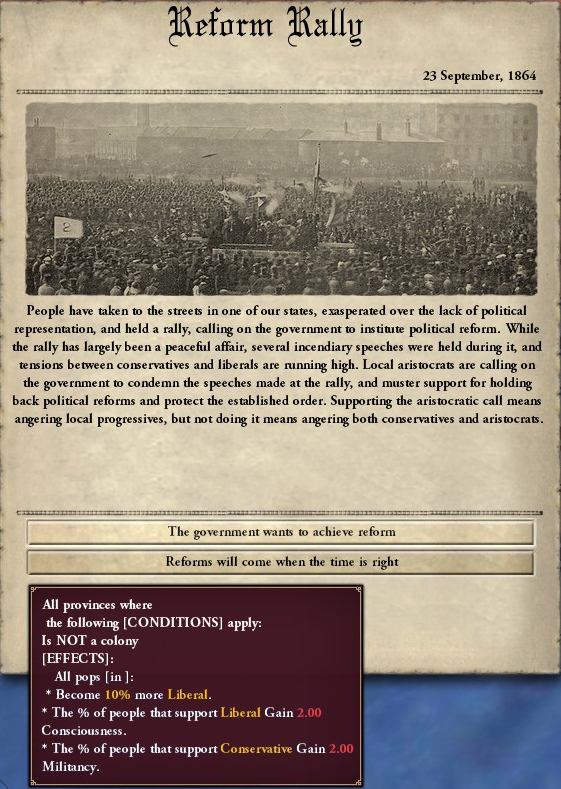
Grand Vizier Abdulaziz pledges future reform after mass protests (23rd September 1864)
In December 1864, Switzerland called an international convention in the city of Geneva to discuss a potential formalisation of the international Rules of War. The huge casualties in recent wars had invoked horror the world-over; and governments from across the civilised world came together to support the Swiss ideas. After the large losses that the Porte had suffered in the wars with Prussia and France in recent years, Sultan Abdulmejid was very much in favour of these humanitarian goals, and the Ottoman Empire consequently signed the “Geneva Convention” on December 17th 1864. This was widely published within the Empire by the Propaganda Ministry, with the Empire’s lauding for its progressive agenda being something the Ottoman populace could be united around.
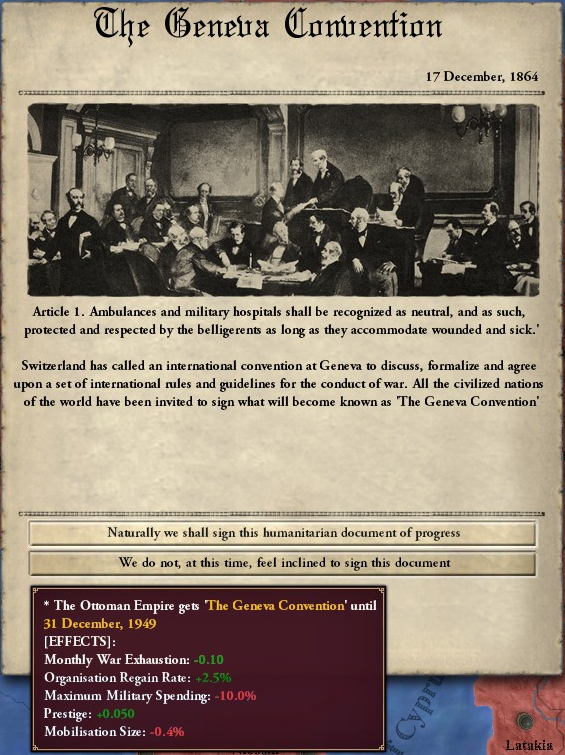
The Geneva Convention formalises the first international rules on the conduct of war (17th December 1864)
Elsewhere in Europe, Prussian Chancellor Otto von Bismarck had been true to his word and not called the Porte into the Austro-Prussian Brother’s War. The Kingdom of Bavaria, alarmed by the rising power of the Prussians, had allied with the Habsburg’s at the start of the war. The Habsburg Empire, exhausted by the constant conflict on its soil in recent years, was unable to put up much resistance, with Bavaria therefore bearing the brunt of much of the actual fighting. Whilst they fought bravely, the overwhelming numerical superiority of the North German forces meant they were able to crush the Bavarians by summer 1864.
Soon after, and for the second time in the space of a year, foreign troops occupied the city of Vienna; and in winter 1864 the Habsburg government raised the flag of surrender. The Duchy of Holstein was reabsorbed into the North German Federation, and the Kingdom of Wurttemberg, the Duchy of Baden, and the Kingdom of Bavaria were all brought into the Prussian Sphere of Influence in the ensuing peace treaty.
The Habsburg Government was also forced to relinquish all claims to be the leaders of the German People, and negotiations to form a unified German state began as a result. On July 26th 1865, the southern German states agreed to unify with the North German Federation, and the German Empire was subsequently formed, with its capital in Berlin. A new great power in the world had been born, and the Porte’s decision to abandon the Habsburg’s to side with the Hohenzollern’s was vindicated.
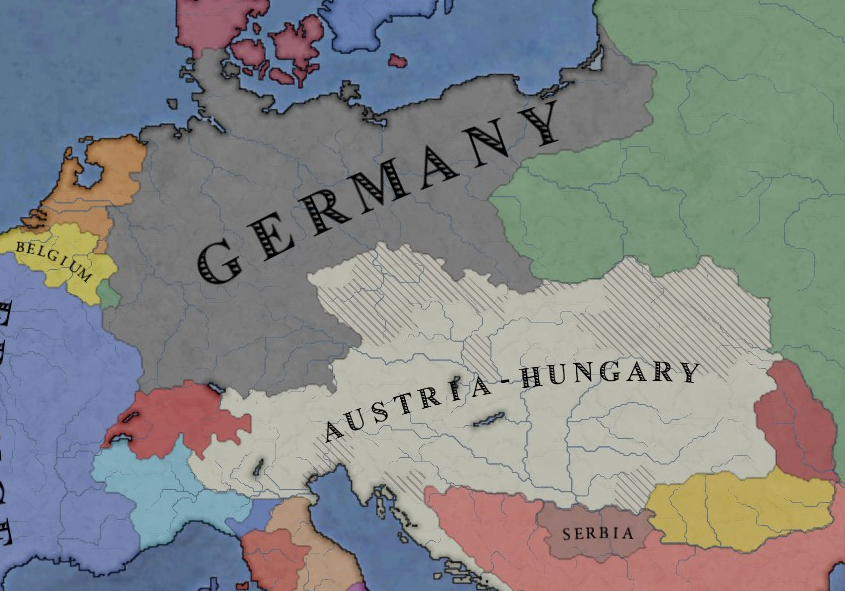
The Unification of the German Empire is completed while rebellion breaks out across Austria-Hungary (July 26th 1865)
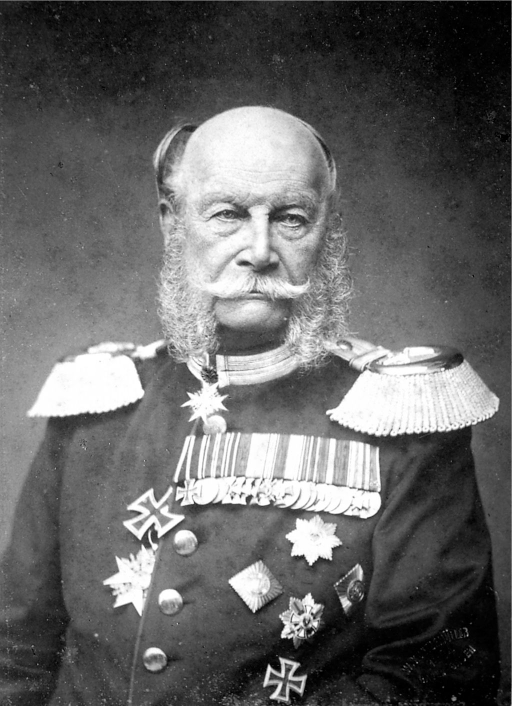
Kaiser Wilhem of Prussia was crowned German Emperor
As for Austria-Hungary, the persistent defeat of Habsburg forces in the past decades had stretched the Empire to breaking point, and huge rebellions broke across once more, with even the previously loyal Czechs rising up against the broken authority of Vienna. It was the Poles who drew the most attention though, with Habsburg authorities driven out of Galicia-Lodomeria entirely.
The new German Empire, seeing an opportunity to cement its authority over its southern neighbour, backed the Polish Rebels and called an international conference on August 12th 1865. The powerless Habsburg government capitulated immediately, and once they were given assurance that the Germans would not support any other rebels, the Austro-Hungarian government accepted the declaration of independence of the Kingdom of Galicia-Lodomeria. The Poles had a self-governing state for the first time in nearly a century, although their government was under much German influence as a result of the International Conference.
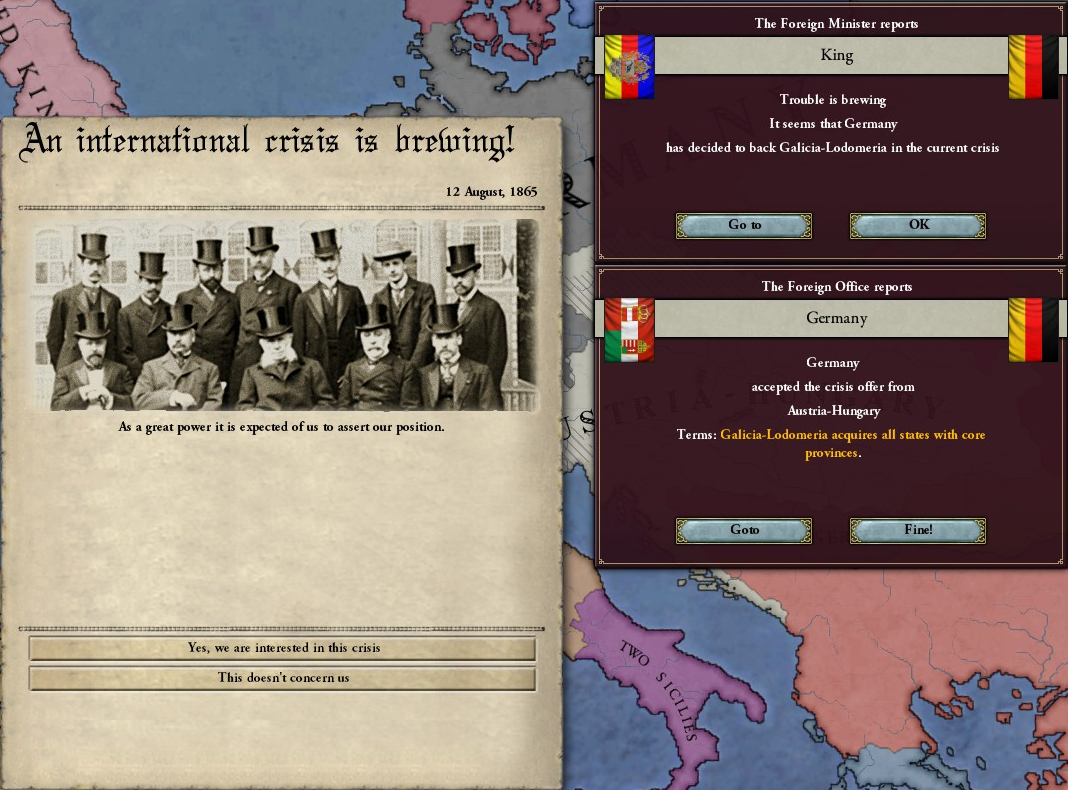
The Kingdom of Galicia-Lodomeria gains independence from the Habsburg Empire (12th August 1865)
To cement our place in this new world order, Grand Vizier Abdulaziz called for an imperial parade in Istanbul in December 1865, demonstrating forces from every corner of the Empire. Foreign dignitaries were invited to see our splendour, with a brigade of German soldiers welcomed into the parade alongside the Royal Guard of the Sultan to show the friendship between our two great nations. The message to the world was clear: The Ottoman Empire was not something the world could dismiss no longer.
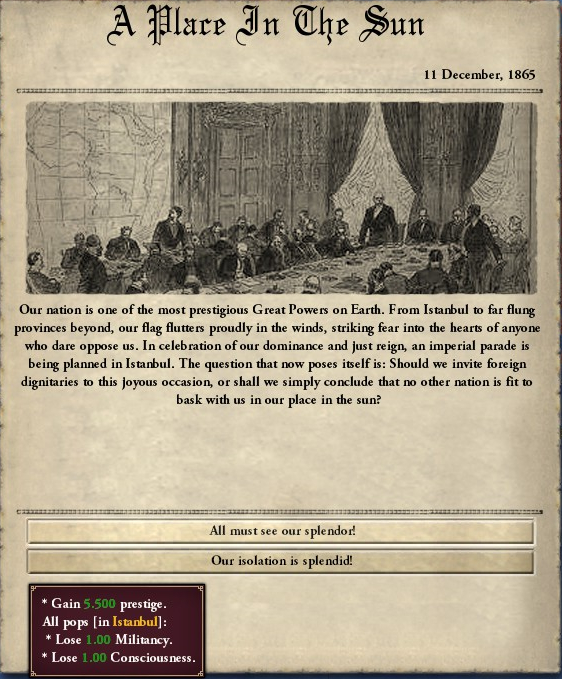
The Grand Ottoman Imperial Parade is held in Istanbul (11th December 1865)
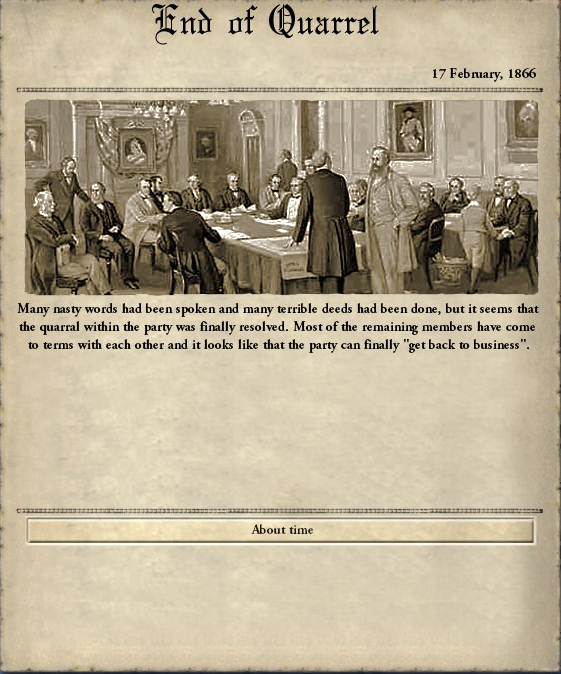
The Liberal factions ended their quarrel following Resid Pasha's return to Istanbul (17th February 1866)
As 1866 began, the Ottoman economy began to see signs of economic growth once more, and the liberal factions in the Porte ended their quarrel and came together once more to demand political reform as a result. Former Grand Vizier Resid Pasha returned to Istanbul as the liberals began to put concerted pressure on Grand Vizier Abdulaziz, but the situation changed drastically in March 1866. Sultan Abdulmejid’s health had been worsening for some time, and in March the great Sultan contracted tuberculosis. Despite a drawn out battle with the illness, on April 16th he sadly passed away.
One of the greatest Sultans in Ottoman history, Abdulmejid 'the Great' had restored the prestige of the Empire and made it into one of the strongest powers in Europe once again, whilst also overseeing a series of reforms to boost the status of minorities across the Empire. A week of National Mourning was declared, and his funeral in Istanbul was an extremely lavish affair. World leaders such as Habsburg Emperor Franz Josef, Kaiser Wilhelm and his Chancellor Otto von Bismarck, and British Prime Minister the Earl of Derby were all in attendance, alongside delegations from all the major nations of the world, with even our enemies in France sending their Foreign Minister. Abdulmejid’s brother Abdulaziz was subsequently crowned Sultan of the Empire, and seeing an opportunity to prevent any conflict over his accession, the popular Resid Pasha returned as Grand Vizier, despite the previous conflicts between the two men.
Following his accession to the throne, the Foreign Office prepared a report on the state of the world for Sultan Abdulaziz, the details of which are to be published below shortly.

Resid Pasha is reappointed Grand Vizier following the accession of Abdulaziz to the Sultanate (April 16th 1866)

Grand Vizier Abdulaziz pledges future reform after mass protests (23rd September 1864)
In December 1864, Switzerland called an international convention in the city of Geneva to discuss a potential formalisation of the international Rules of War. The huge casualties in recent wars had invoked horror the world-over; and governments from across the civilised world came together to support the Swiss ideas. After the large losses that the Porte had suffered in the wars with Prussia and France in recent years, Sultan Abdulmejid was very much in favour of these humanitarian goals, and the Ottoman Empire consequently signed the “Geneva Convention” on December 17th 1864. This was widely published within the Empire by the Propaganda Ministry, with the Empire’s lauding for its progressive agenda being something the Ottoman populace could be united around.

The Geneva Convention formalises the first international rules on the conduct of war (17th December 1864)
Elsewhere in Europe, Prussian Chancellor Otto von Bismarck had been true to his word and not called the Porte into the Austro-Prussian Brother’s War. The Kingdom of Bavaria, alarmed by the rising power of the Prussians, had allied with the Habsburg’s at the start of the war. The Habsburg Empire, exhausted by the constant conflict on its soil in recent years, was unable to put up much resistance, with Bavaria therefore bearing the brunt of much of the actual fighting. Whilst they fought bravely, the overwhelming numerical superiority of the North German forces meant they were able to crush the Bavarians by summer 1864.
Soon after, and for the second time in the space of a year, foreign troops occupied the city of Vienna; and in winter 1864 the Habsburg government raised the flag of surrender. The Duchy of Holstein was reabsorbed into the North German Federation, and the Kingdom of Wurttemberg, the Duchy of Baden, and the Kingdom of Bavaria were all brought into the Prussian Sphere of Influence in the ensuing peace treaty.
The Habsburg Government was also forced to relinquish all claims to be the leaders of the German People, and negotiations to form a unified German state began as a result. On July 26th 1865, the southern German states agreed to unify with the North German Federation, and the German Empire was subsequently formed, with its capital in Berlin. A new great power in the world had been born, and the Porte’s decision to abandon the Habsburg’s to side with the Hohenzollern’s was vindicated.

The Unification of the German Empire is completed while rebellion breaks out across Austria-Hungary (July 26th 1865)

Kaiser Wilhem of Prussia was crowned German Emperor
As for Austria-Hungary, the persistent defeat of Habsburg forces in the past decades had stretched the Empire to breaking point, and huge rebellions broke across once more, with even the previously loyal Czechs rising up against the broken authority of Vienna. It was the Poles who drew the most attention though, with Habsburg authorities driven out of Galicia-Lodomeria entirely.
The new German Empire, seeing an opportunity to cement its authority over its southern neighbour, backed the Polish Rebels and called an international conference on August 12th 1865. The powerless Habsburg government capitulated immediately, and once they were given assurance that the Germans would not support any other rebels, the Austro-Hungarian government accepted the declaration of independence of the Kingdom of Galicia-Lodomeria. The Poles had a self-governing state for the first time in nearly a century, although their government was under much German influence as a result of the International Conference.

The Kingdom of Galicia-Lodomeria gains independence from the Habsburg Empire (12th August 1865)
To cement our place in this new world order, Grand Vizier Abdulaziz called for an imperial parade in Istanbul in December 1865, demonstrating forces from every corner of the Empire. Foreign dignitaries were invited to see our splendour, with a brigade of German soldiers welcomed into the parade alongside the Royal Guard of the Sultan to show the friendship between our two great nations. The message to the world was clear: The Ottoman Empire was not something the world could dismiss no longer.

The Grand Ottoman Imperial Parade is held in Istanbul (11th December 1865)

The Liberal factions ended their quarrel following Resid Pasha's return to Istanbul (17th February 1866)
As 1866 began, the Ottoman economy began to see signs of economic growth once more, and the liberal factions in the Porte ended their quarrel and came together once more to demand political reform as a result. Former Grand Vizier Resid Pasha returned to Istanbul as the liberals began to put concerted pressure on Grand Vizier Abdulaziz, but the situation changed drastically in March 1866. Sultan Abdulmejid’s health had been worsening for some time, and in March the great Sultan contracted tuberculosis. Despite a drawn out battle with the illness, on April 16th he sadly passed away.
One of the greatest Sultans in Ottoman history, Abdulmejid 'the Great' had restored the prestige of the Empire and made it into one of the strongest powers in Europe once again, whilst also overseeing a series of reforms to boost the status of minorities across the Empire. A week of National Mourning was declared, and his funeral in Istanbul was an extremely lavish affair. World leaders such as Habsburg Emperor Franz Josef, Kaiser Wilhelm and his Chancellor Otto von Bismarck, and British Prime Minister the Earl of Derby were all in attendance, alongside delegations from all the major nations of the world, with even our enemies in France sending their Foreign Minister. Abdulmejid’s brother Abdulaziz was subsequently crowned Sultan of the Empire, and seeing an opportunity to prevent any conflict over his accession, the popular Resid Pasha returned as Grand Vizier, despite the previous conflicts between the two men.
Following his accession to the throne, the Foreign Office prepared a report on the state of the world for Sultan Abdulaziz, the details of which are to be published below shortly.

Resid Pasha is reappointed Grand Vizier following the accession of Abdulaziz to the Sultanate (April 16th 1866)
- 1
All in all a very positive set of developments. Perhaps the Porte will have some time and energy (and blood and treasure) to now devote once more to internal devlopments.
RIP Abdulmejid  Your star has shone bright indeed upon the lands.
Your star has shone bright indeed upon the lands.
Abandoning the Austrians might leave a bad taste in the mouths of some, but it was becoming increasingly clear that the Habsburgs had become an anchor, and that remaining chained to them would only drag the Ottomans down with them eventually. Germany, however, is a truly dynamic rising power at this moment.
Abandoning the Austrians might leave a bad taste in the mouths of some, but it was becoming increasingly clear that the Habsburgs had become an anchor, and that remaining chained to them would only drag the Ottomans down with them eventually. Germany, however, is a truly dynamic rising power at this moment.
Chapter Sixteen: The World in 1866
To your Imperial Majesty, Abdul Aziz bin Mahmud Osmanli, Sultan of the Ottoman Empire, Caliph of Islam, Amir al-Mu’minin, Kayser-i-Rum, and Custodian of the Two Holy Mosques. The following documents outline the most up to date knowledge your Foreign Office has about the wider world, as requested. I hope you find the information contained to be of satisfactory detail, and I await further orders.
- Resid Pasha, Grand Vizier of the Ottoman Empire
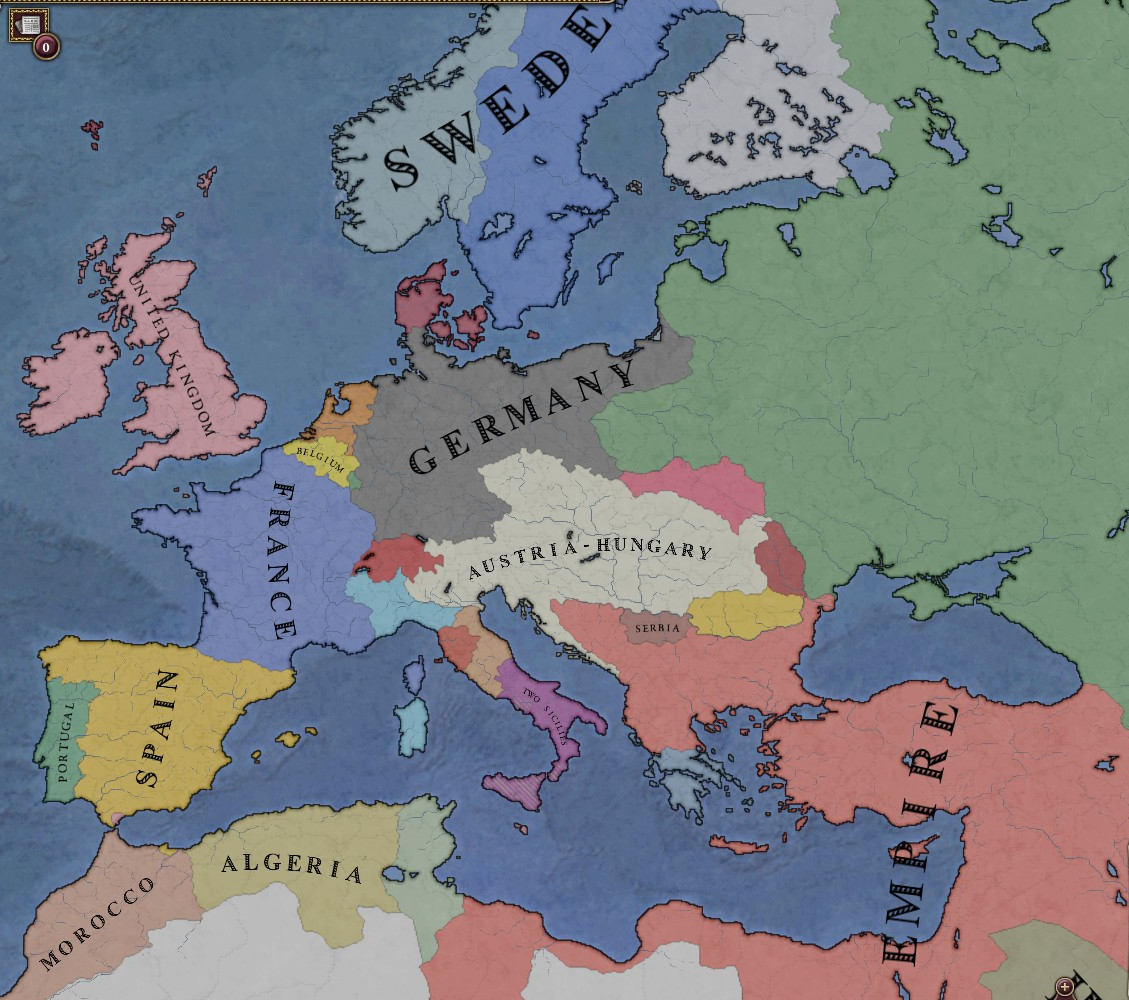
A Map of Europe in April 1866

A Map of North America in April 1866
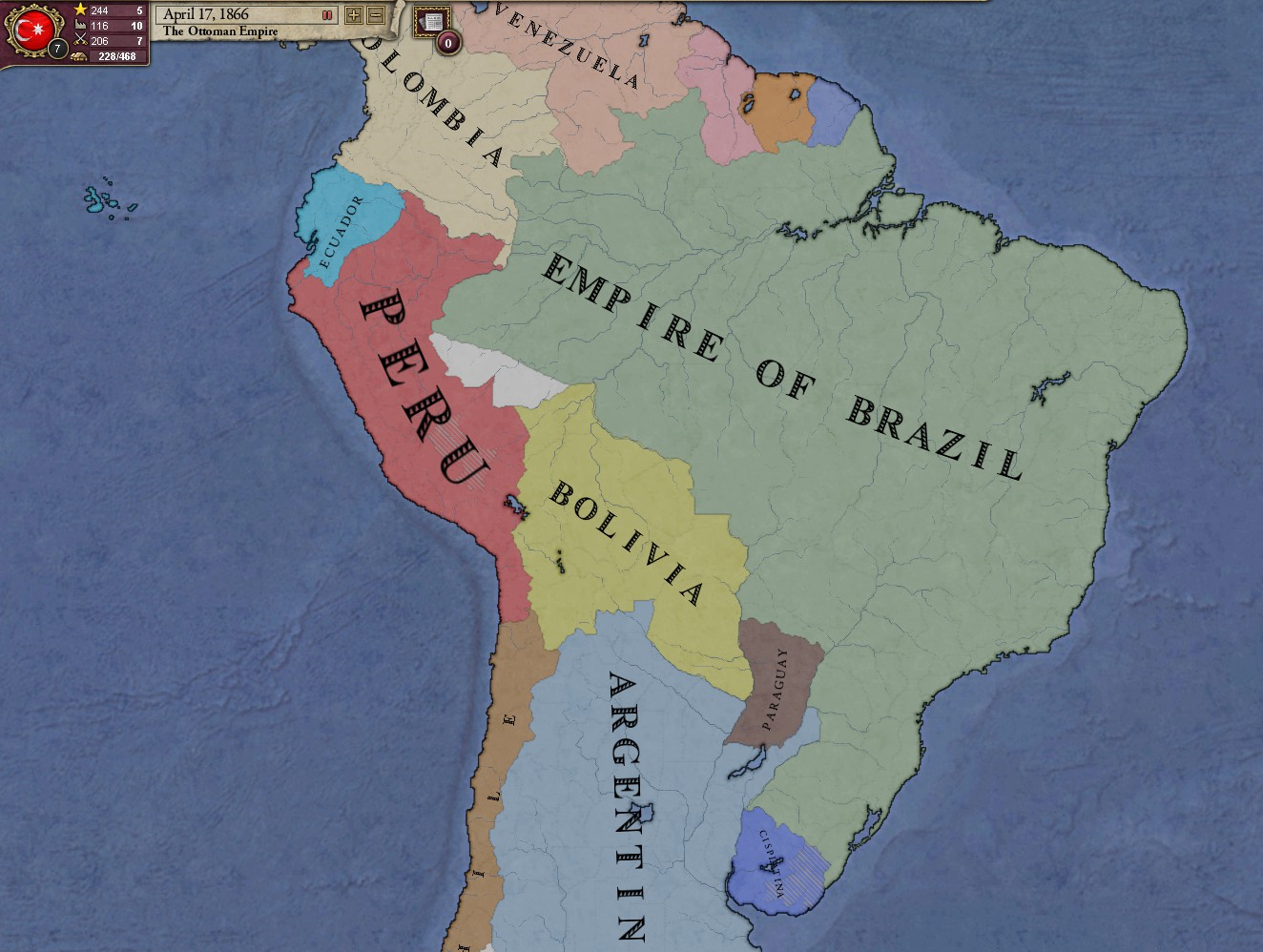
A Map of South America in April 1866
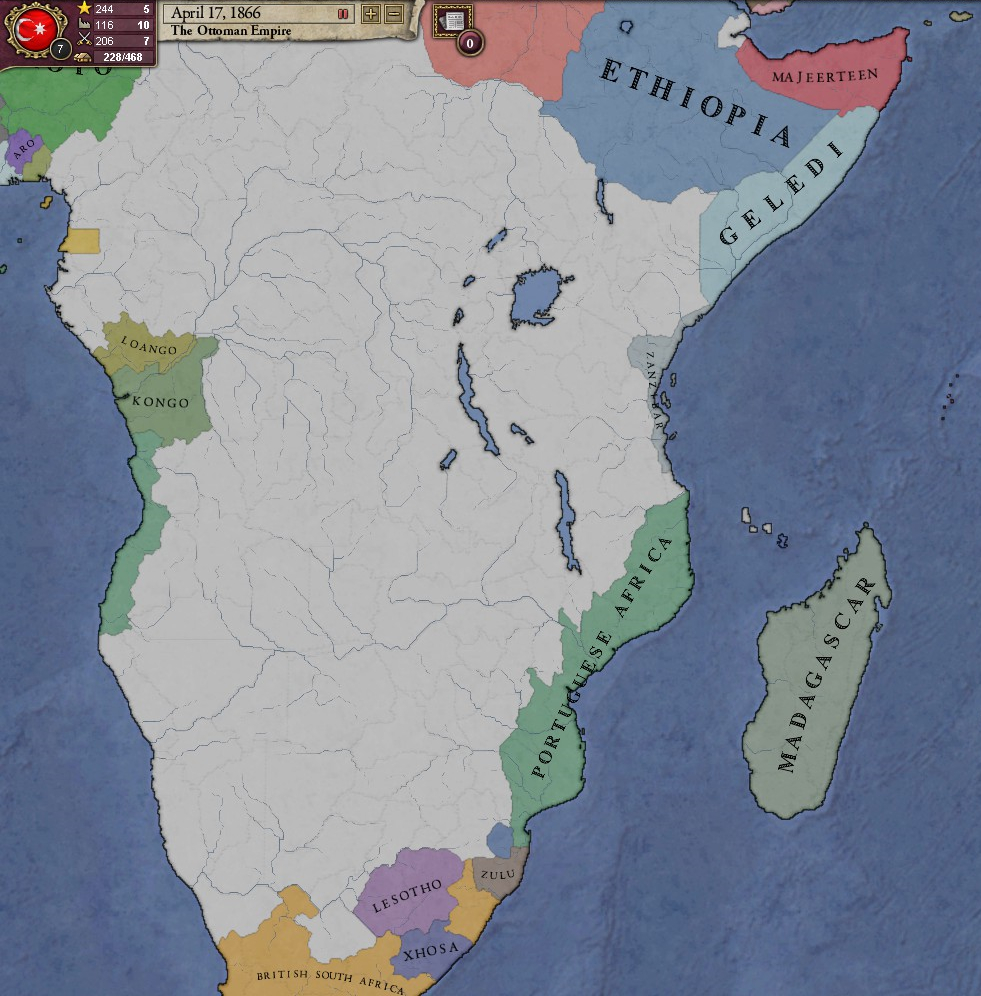
A Map of East & Southern Africa in April 1866
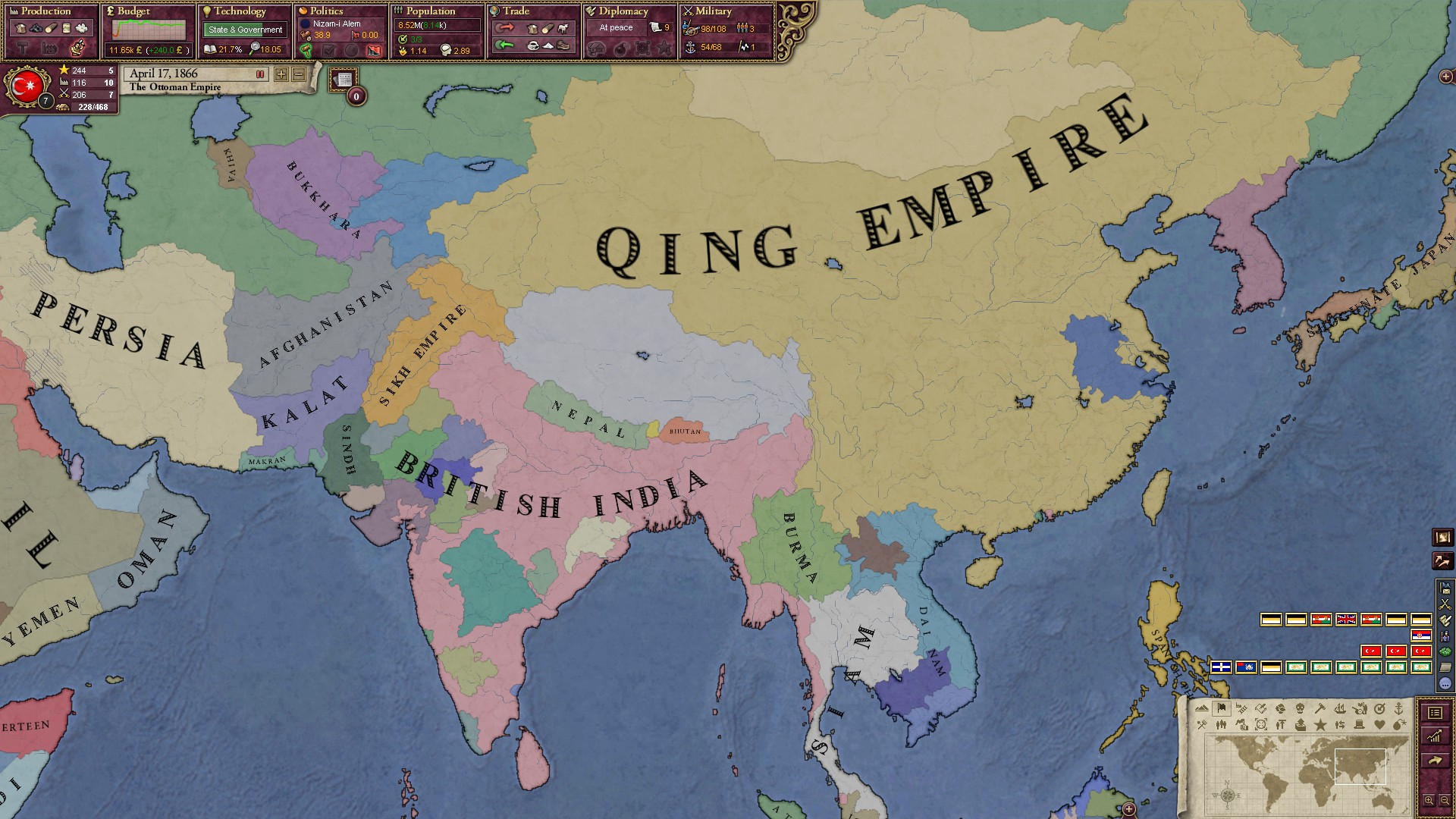
A Map of Asia in April 1866
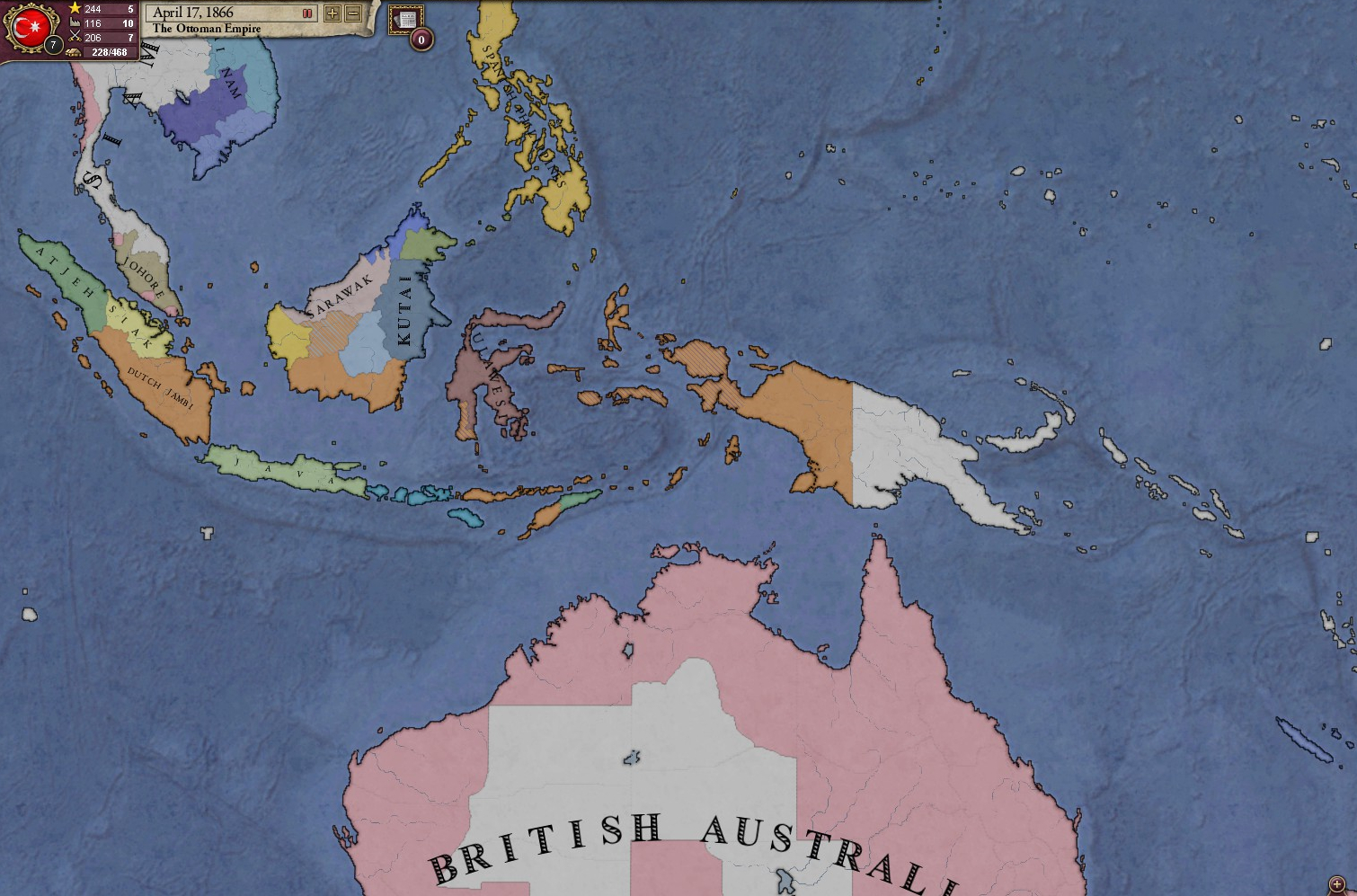
A Map of the East Indies in April 1866
To conclude our report, we have listed the major powers of the world in order of their relevance (rank). I hope you find the information of use, your Imperial Majesty.
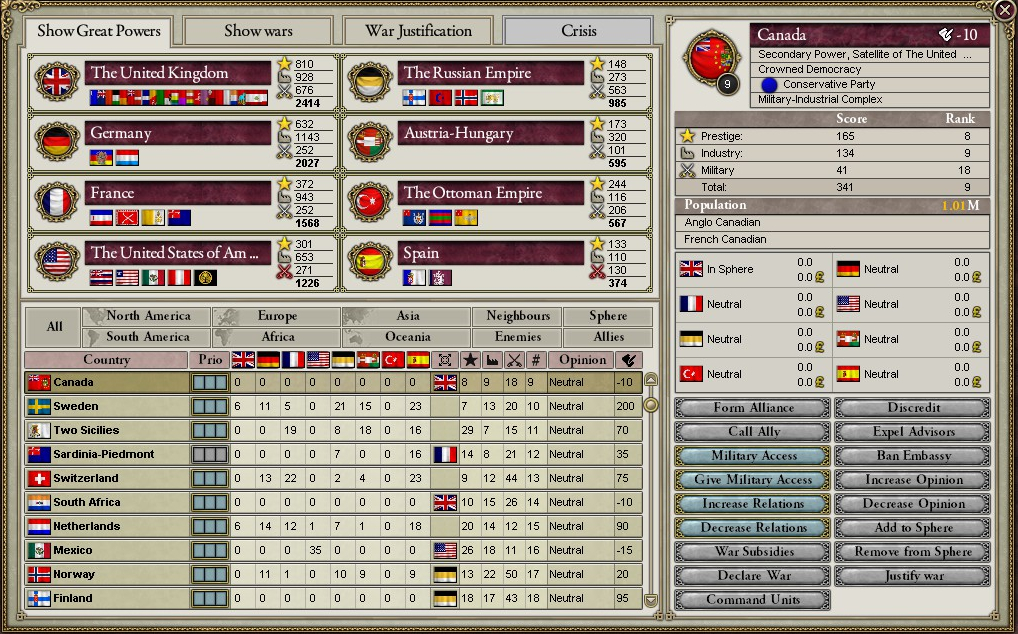
The World Powers in April 1866
- Resid Pasha, Grand Vizier of the Ottoman Empire

A Map of Europe in April 1866
On the continent of Europe, there has been much change in recent years. The successful unification of the German Empire under the leadership of the Prussian Kaiser Wilhelm von Hohenzollern has created an industrial powerhouse at the heart of Europe, with the recent Franco-Prussian War having seen the Germans acquire the states of Elsass-Lothringen from the Kingdom of France. Germany has a strange governing system, with the Prussians having ceded their powers to their Chancellorship in years past, and the many Princes and Kings of the constituent states of Germany are also merely figureheads now. Germany as such is similar to the United Kingdom in being a Crowned Democracy, but with far more royal figures. The Germans currently have a Conservative government led by our ally Otto von Bismarck.
The United Kingdom, or the British Empire, remains the foremost power of the world. Aside from the British Isles, London continues to rule the strategic bases of Gibraltar and Malta in the Mediterranean Sea, as well as their larger Empire across the globe. As you know, the Royal Navy of Britain is the foremost in the world, and protects their many trade routes. The British currently have a Conservative government led by the Earl of Derby, under the rule of Queen Victoria.
The Kingdom of France has suffered many setbacks in recent years: Not least the defeats we inflicted upon them ourselves in the recent war. Nonetheless, King Louis-Philippe II of the House of Orleans has maintained a delicate juggling act and kept the throne of the so-called “July Monarchy”. His governing party, the Conservative “Bonapartistes”, are known to have sympathy with the exiled Prince Louis Napoleon of the Bonaparte dynasty, but he has never managed to claim the throne for himself. The loss of the states of Elsass-Lothringen (or Alsace-Lorraine, as they were previously known) to the Germans has caused much bitterness in Paris, and it is likely that they will seek to reclaim the lands in future. Our driving of the French from Algeria has also humiliated them, and how France responds to their recent failures will be of great importance.
Emperor Franz Josef von Habsburg of Austria-Hungary, our former ally, has overseen a period of terrible decline for the Habsburg Empire. His two defeats to Prussia have led to the formation of Germany under their historic rivals, the Hohenzollerns, and a great reduction in the prestige of the Habsburg Monarchy. The compromise with the Hungarians has also led to calls for inclusion from many of the other ethnicities of their Empire, and a number of rebellions have caused problems for Vienna in recent years. The Poles have recently seceded entirely from Habsburg rule to form the German-allied Kingdom of Galicia-Lodomeria, and the Habsburgs have also struggled in wars with the Italians and the Serbs. Austria-Hungary is a Constitutional Monarchy, with the Emperor retaining a far larger large say over its politics than in Britain, France, or Germany. Their government is led by the Conservative Baron Alexander von Bach.
The Russian Empire, under the Tsar Alexander II of the Romanov Dynasty, has been quiet in recent years. Whilst the Russians have historically always been our enemies, and there remains no friendship between our nations, Russia has not openly acted against us since the Southern Serbia Crisis nearly twenty years ago. Our backing of their position over the French in the Levantine Crisis soon after that has resulted in a period of calm, but their continued meddling in our vassals of Moldavia and Wallachia could yet spark further conflict between our nations. Russia has in the meantime focused on the Far East, with a number of conflicts with the Shogunate of Japan in recent years. Nevertheless, the Conservative Slavophile government must be treated with great caution by the Porte. Russia did not intervene in the German Unification process, despite their concerns over the formation of such a strong neighbour, and they remain untouched by war in Europe for many years now.
The final other Great Power of Europe, the Spanish Empire, remains far weaker than what it was historically. The Bourbon Queen Isabella II maintains the throne, but is as much of a figurehead in the Crowned Democracy as her counterparts in Britain, France, and Germany. Our relations with Spain have improved significantly in recent years, with the Conservative Union Liberal party (led by Leopoldo O’Donnell, Count of Lucena) having been greatly alarmed by the French meddling in the affairs of other European countries - as the Peninsula War is still remembered with distaste in Spain. Spain has stayed out of wars in Europe of late, instead turning its eye abroad: A recent diplomatic spat with Peru in South America has led to their seizure of the guano-rich Chincha Islands off the Peruvian Coast; which has in turn sparked a war with Peru, with the Peruvians joined by their allies in Argentina. This war will be an interesting test of the strength of the Spanish military, and could signal the start of a return to their former greatness - or contrarily that their decline is unstoppable.
Elsewhere in Europe, The Kingdom of Sardinia-Piedmont has taken advantage of the weakness of Austria-Hungary to peacefully annex the Duchy of Modena in recent years, along with the Duchy of Parma, and harbours clear desire to unite the Italian people much in the same way that Prussia has united the Germans. The Kingdom of the Two Sicilies, under King Francis II of the Bourbon Dynasty, is currently suffering from a number of rebellions that may yet give an opportunity for Sardinia-Piedmont to achieve its goal.
In the Lowlands, the Dutch have continued to focus on their overseas Empire, with mixed success in recent years - much like the Portuguese in Iberia, whilst Belgium has succeeded in maintaining its independence with the support of the British. In Scandinavia, the Kingdom of Sweden-Norway, our ally, has been at peace for many years, though rumours of potential Scandinavian Unification have been discreetly encouraged by the Swedes since the Danish loss of Schleswig-Holstein.
Closer to home, the Kingdom of Greece underwent a revolution during the Springtime of Nations in the 1840s, which saw its King reduced to a figurehead role. In recent years, Greece has joined the British Sphere of Influence, and the British have ceded the Duchy of the Ionian Islands to the Greek government as a result. Greece still harbours hopes of claiming more of our lands from us, but our good relations with the British government have prevented them from acting upon these in recent times. The Principality of Serbia, which continues to ignore our suzerainty over them, is not in any Sphere; though the Russians maintain friendly relations with them, which have dissuaded previous Ottoman regimes from attempting to bring the Serbs back into line.
The United Kingdom, or the British Empire, remains the foremost power of the world. Aside from the British Isles, London continues to rule the strategic bases of Gibraltar and Malta in the Mediterranean Sea, as well as their larger Empire across the globe. As you know, the Royal Navy of Britain is the foremost in the world, and protects their many trade routes. The British currently have a Conservative government led by the Earl of Derby, under the rule of Queen Victoria.
The Kingdom of France has suffered many setbacks in recent years: Not least the defeats we inflicted upon them ourselves in the recent war. Nonetheless, King Louis-Philippe II of the House of Orleans has maintained a delicate juggling act and kept the throne of the so-called “July Monarchy”. His governing party, the Conservative “Bonapartistes”, are known to have sympathy with the exiled Prince Louis Napoleon of the Bonaparte dynasty, but he has never managed to claim the throne for himself. The loss of the states of Elsass-Lothringen (or Alsace-Lorraine, as they were previously known) to the Germans has caused much bitterness in Paris, and it is likely that they will seek to reclaim the lands in future. Our driving of the French from Algeria has also humiliated them, and how France responds to their recent failures will be of great importance.
Emperor Franz Josef von Habsburg of Austria-Hungary, our former ally, has overseen a period of terrible decline for the Habsburg Empire. His two defeats to Prussia have led to the formation of Germany under their historic rivals, the Hohenzollerns, and a great reduction in the prestige of the Habsburg Monarchy. The compromise with the Hungarians has also led to calls for inclusion from many of the other ethnicities of their Empire, and a number of rebellions have caused problems for Vienna in recent years. The Poles have recently seceded entirely from Habsburg rule to form the German-allied Kingdom of Galicia-Lodomeria, and the Habsburgs have also struggled in wars with the Italians and the Serbs. Austria-Hungary is a Constitutional Monarchy, with the Emperor retaining a far larger large say over its politics than in Britain, France, or Germany. Their government is led by the Conservative Baron Alexander von Bach.
The Russian Empire, under the Tsar Alexander II of the Romanov Dynasty, has been quiet in recent years. Whilst the Russians have historically always been our enemies, and there remains no friendship between our nations, Russia has not openly acted against us since the Southern Serbia Crisis nearly twenty years ago. Our backing of their position over the French in the Levantine Crisis soon after that has resulted in a period of calm, but their continued meddling in our vassals of Moldavia and Wallachia could yet spark further conflict between our nations. Russia has in the meantime focused on the Far East, with a number of conflicts with the Shogunate of Japan in recent years. Nevertheless, the Conservative Slavophile government must be treated with great caution by the Porte. Russia did not intervene in the German Unification process, despite their concerns over the formation of such a strong neighbour, and they remain untouched by war in Europe for many years now.
The final other Great Power of Europe, the Spanish Empire, remains far weaker than what it was historically. The Bourbon Queen Isabella II maintains the throne, but is as much of a figurehead in the Crowned Democracy as her counterparts in Britain, France, and Germany. Our relations with Spain have improved significantly in recent years, with the Conservative Union Liberal party (led by Leopoldo O’Donnell, Count of Lucena) having been greatly alarmed by the French meddling in the affairs of other European countries - as the Peninsula War is still remembered with distaste in Spain. Spain has stayed out of wars in Europe of late, instead turning its eye abroad: A recent diplomatic spat with Peru in South America has led to their seizure of the guano-rich Chincha Islands off the Peruvian Coast; which has in turn sparked a war with Peru, with the Peruvians joined by their allies in Argentina. This war will be an interesting test of the strength of the Spanish military, and could signal the start of a return to their former greatness - or contrarily that their decline is unstoppable.
Elsewhere in Europe, The Kingdom of Sardinia-Piedmont has taken advantage of the weakness of Austria-Hungary to peacefully annex the Duchy of Modena in recent years, along with the Duchy of Parma, and harbours clear desire to unite the Italian people much in the same way that Prussia has united the Germans. The Kingdom of the Two Sicilies, under King Francis II of the Bourbon Dynasty, is currently suffering from a number of rebellions that may yet give an opportunity for Sardinia-Piedmont to achieve its goal.
In the Lowlands, the Dutch have continued to focus on their overseas Empire, with mixed success in recent years - much like the Portuguese in Iberia, whilst Belgium has succeeded in maintaining its independence with the support of the British. In Scandinavia, the Kingdom of Sweden-Norway, our ally, has been at peace for many years, though rumours of potential Scandinavian Unification have been discreetly encouraged by the Swedes since the Danish loss of Schleswig-Holstein.
Closer to home, the Kingdom of Greece underwent a revolution during the Springtime of Nations in the 1840s, which saw its King reduced to a figurehead role. In recent years, Greece has joined the British Sphere of Influence, and the British have ceded the Duchy of the Ionian Islands to the Greek government as a result. Greece still harbours hopes of claiming more of our lands from us, but our good relations with the British government have prevented them from acting upon these in recent times. The Principality of Serbia, which continues to ignore our suzerainty over them, is not in any Sphere; though the Russians maintain friendly relations with them, which have dissuaded previous Ottoman regimes from attempting to bring the Serbs back into line.

A Map of North America in April 1866
In North America, the end of the American Civil War has seen peace return to the continent. The United States of America remain the only non-European Great Power of the world, although the British Dominion of Canada has been undergoing remarkable growth and industrialisation in recent years. The Mexicans, since their defeat to the Americans which saw the loss of half their territory, have been unable to challenge American supremacy - although they have reconquered the Yucatan Peninsula from secessionist rebels in recent years.
The many successors to the United States of Central America remain of little importance to the world, as do the independent Caribbean nations of Haiti and the Dominican Republic. The Caribbean islands themselves remain under the rule of various European powers, including Spain, Britain, France, Denmark, and the Netherlands.
The many successors to the United States of Central America remain of little importance to the world, as do the independent Caribbean nations of Haiti and the Dominican Republic. The Caribbean islands themselves remain under the rule of various European powers, including Spain, Britain, France, Denmark, and the Netherlands.

A Map of South America in April 1866
South America has seen much conflict in recent years, with many unstable governments having formed from the successors to the former Spanish and Portuguese Empires there. The Empire of Brazil remains the predominant power, ruling much of the continent. Colombia, Venezuela, and the European colonial states in the Guayanas have remained fairly stable, too. The independent nation of Ecuador lost much of its internal territory to Peru after a war, and has remained a minor player ever since.
Peru itself, having thrown off the shackles of rule from Bolivia in their shortlived Confederation, has been in a series of wars with Chile and Bolivia, and now finds itself at war with the Spanish Empire. Peru is allied with Argentina, which has also found itself in many wars, having gained land from both Bolivia and Paraguay in recent years. Furthermore, Peru’s former ally Bolivia has also found itself in near-constant war from its formation, and it maintains claims to the Pacific coastline currently occupied by Peru and Chile.
Paraguay has been in multiple wars during its brief existence, but recent defeats to Bolivia and Argentina have seen it lose much of its land. The Paraguayan military does however maintain control of the state, and it is likely they will yet attempt to regain those lands should the opportunity arise.
Civil wars have also led to a strange return of monarchism to some of the former Spanish colonies, with the Chilean Civil War leading to the crowning of King Manuel Montt, despite his poor family background. The Kingdom of Cisplatina, formerly known as Uruguay, has also recently seen the coronation of a King, in the shape of Gabriel Pereira, after the end of one of the many internal conflicts there.
Peru itself, having thrown off the shackles of rule from Bolivia in their shortlived Confederation, has been in a series of wars with Chile and Bolivia, and now finds itself at war with the Spanish Empire. Peru is allied with Argentina, which has also found itself in many wars, having gained land from both Bolivia and Paraguay in recent years. Furthermore, Peru’s former ally Bolivia has also found itself in near-constant war from its formation, and it maintains claims to the Pacific coastline currently occupied by Peru and Chile.
Paraguay has been in multiple wars during its brief existence, but recent defeats to Bolivia and Argentina have seen it lose much of its land. The Paraguayan military does however maintain control of the state, and it is likely they will yet attempt to regain those lands should the opportunity arise.
Civil wars have also led to a strange return of monarchism to some of the former Spanish colonies, with the Chilean Civil War leading to the crowning of King Manuel Montt, despite his poor family background. The Kingdom of Cisplatina, formerly known as Uruguay, has also recently seen the coronation of a King, in the shape of Gabriel Pereira, after the end of one of the many internal conflicts there.

A Map of East & Southern Africa in April 1866
Sub-Saharan Africa remains of little knowledge to the Porte, with the many tribes of West Africa being well beyond our ability to conduct any relations with. East Africa is the home of the recently reunited Ethiopian Empire, which borders our Vilayets in the Sudan region. This Christian Empire does not have friendly relations with us, and their narrow strip of coastline in Eritrea could be a tempting target for us to expand into in future.
Further south, the tribes of the Somali people occupy the coastline on the Horn of Africa, whilst the Portuguese Empire maintains its colonies in Angola and Mozambique. The Sultanate of Zanzibar has recently formed following a civil war on the death of Sultan Said bin Sultan of Oman. His son Majid bin Said now rules Zanzibar independently of his brother Thuwaini bin Said, who rules in Muscat.
In the very south of Africa, the British acquisition of the Cape Colony from the Netherlands during the Napoleonic Wars saw a series of disagreements between the British colonists and the former Dutch descendants (known as the Boers). Rather than have this lead to constant fighting, the British government in recent years has instead promoted the Boers to lead a self-governing Dominion of South Africa, with the British and Boer residents treated equally as a result.
Further south, the tribes of the Somali people occupy the coastline on the Horn of Africa, whilst the Portuguese Empire maintains its colonies in Angola and Mozambique. The Sultanate of Zanzibar has recently formed following a civil war on the death of Sultan Said bin Sultan of Oman. His son Majid bin Said now rules Zanzibar independently of his brother Thuwaini bin Said, who rules in Muscat.
In the very south of Africa, the British acquisition of the Cape Colony from the Netherlands during the Napoleonic Wars saw a series of disagreements between the British colonists and the former Dutch descendants (known as the Boers). Rather than have this lead to constant fighting, the British government in recent years has instead promoted the Boers to lead a self-governing Dominion of South Africa, with the British and Boer residents treated equally as a result.

A Map of Asia in April 1866
To our east in the great continent of Asia, The Kingdom of Persia has been attempting to embrace Western values and modernise its government in recent years, with much success. The Persian King, Nassereddin Shah Qajar, has however taken his country into the Russian Sphere of Influence despite the territorial losses the Persians suffered in the Russo-Persian Wars of the early 19th century - something which could cause problems for the Porte in future.
To the east of Persia is the home of the many desert tribes of the Hazara, Tajik, Pashtun and Balochi peoples. This region of Central Asia has seen much competition for influence between the British and Russian Empires in recent years, known as the “Great Game”, with Russia annexing many of the more northern tribes as a result.
Between Russia and India is the Sikh Empire, where the militaristic Sikh faith finds its home. The Sikhs have fought many wars with Britain over the years but have preserved their full independence. India itself is the jewel of the British Empire, with the vast lands of the Raj and the British vassals of the Princely States making up almost the entire subcontinent. Britain has also conquered much territory from the Burmese in recent years, and could yet annex more.
Southeast Asia has also recently seen an expansion of French power, with Indochina being the target of French aggression in Asia. Whilst they currently hold only the lands around the city of Saigon, it is likely that they will attempt to expand further in the coming years.
Finally, in the Far East, the Qing Dynasty’s control of China has been shaken in recent years following the loss of the Opium War with Britain, and the Taiping Rebellion leading to an independent “Heavenly Kingdom” controlling much of Central China. Whilst currently undergoing a cessation of hostilities, it is likely that further war is yet to come between the Chinese peoples.
To the east of Persia is the home of the many desert tribes of the Hazara, Tajik, Pashtun and Balochi peoples. This region of Central Asia has seen much competition for influence between the British and Russian Empires in recent years, known as the “Great Game”, with Russia annexing many of the more northern tribes as a result.
Between Russia and India is the Sikh Empire, where the militaristic Sikh faith finds its home. The Sikhs have fought many wars with Britain over the years but have preserved their full independence. India itself is the jewel of the British Empire, with the vast lands of the Raj and the British vassals of the Princely States making up almost the entire subcontinent. Britain has also conquered much territory from the Burmese in recent years, and could yet annex more.
Southeast Asia has also recently seen an expansion of French power, with Indochina being the target of French aggression in Asia. Whilst they currently hold only the lands around the city of Saigon, it is likely that they will attempt to expand further in the coming years.
Finally, in the Far East, the Qing Dynasty’s control of China has been shaken in recent years following the loss of the Opium War with Britain, and the Taiping Rebellion leading to an independent “Heavenly Kingdom” controlling much of Central China. Whilst currently undergoing a cessation of hostilities, it is likely that further war is yet to come between the Chinese peoples.

A Map of the East Indies in April 1866
The East Indies have also been the source of much conflict in recent years, with the Dutch continuing to attempt to expand their control of the islands, with mixed success. The large island of Borneo has come under significant Dutch control, but a recent native rebellion has kicked the Dutch off the island of Java - severely weakening the colonial Administration as a result. Whether the Dutch can reclaim the island remains to be seen…
To conclude our report, we have listed the major powers of the world in order of their relevance (rank). I hope you find the information of use, your Imperial Majesty.

The World Powers in April 1866
Sorry for releasing two full chapters in a single day, that second one turned out to be far less brief than imagined. Got a little carried away when describing Europe 
Yes, the Porte was more than happy to repay its debt from the Oriental Crisis to Austria, but being sucked into a continuous series of huge foreign conflicts was not the mutually beneficial alliance that had originally been envisioned.
By allying with the rapidly rising might of Germany, the Porte aims to secure its place at the greatest tables of the world.
That is the plan, but even the best laid plans are often thrown into chaos by external events...All in all a very positive set of developments. Perhaps the Porte will have some time and energy (and blood and treasure) to now devote once more to internal devlopments.
Abdulmejid the Great shall be up there with Suleiman I the Magnificent, Mehmed II the Conqueror, Selim I the Grim, Murad II, and Osman I himself on the lists of the Greatest Sultans of the Empire. Let us hope that Abdulaziz shall be as successful a leader as his brother!RIP AbdulmejidYour star has shone bright indeed upon the lands.
Abandoning the Austrians might leave a bad taste in the mouths of some, but it was becoming increasingly clear that the Habsburgs had become an anchor, and that remaining chained to them would only drag the Ottomans down with them eventually. Germany, however, is a truly dynamic rising power at this moment.
Yes, the Porte was more than happy to repay its debt from the Oriental Crisis to Austria, but being sucked into a continuous series of huge foreign conflicts was not the mutually beneficial alliance that had originally been envisioned.
By allying with the rapidly rising might of Germany, the Porte aims to secure its place at the greatest tables of the world.
Last edited:
An alliance of a Germany and Ottomans who ate the Austro-Hungarians between themselves, and a unified Scandinavia would be something to be afraid of. It would be a good balanced alliance.Spoiler: Report on Europe
Here is another reason to return my AAR from hiatus, Boers trying to run the Europeans out of Africa. I really missed itIn the very south of Africa, the British acquisition of the Cape Colony from the Netherlands during the Napoleonic Wars saw a series of disagreements between the British colonists and the former Dutch descendants (known as the Boers). Rather than have this lead to constant fighting, the British government in recent years has instead promoted the Boers to lead a self-governing Dominion of South Africa, with the British and Boer residents treated equally as a result.
Indeed, the balance here is also important. Also, many tribes around the Caspian sea and pretty much everything north of Afghanistan are Turkic peoples. If the Ottomans are affected from the French Revolution ideals of nationality, there are brethren there to be freed from the yoke of the oppressive Czars.something which could cause problems for the Porte in future.
Also, the Sikhs can be a good strategic partner for the future maybe?
Very good episodes, and I like the Greek communist flag. Keep up the good work man.
>Dutch kicked out of Java
Well, we done goofed up. That's pretty much everything valuable about Indonesia
Well, we done goofed up. That's pretty much everything valuable about Indonesia
as far as i can remember there was some oil and gold in borneo and sulawesi, wasn't there?>Dutch kicked out of Java
Well, we done goofed up. That's pretty much everything valuable about Indonesia
Threadmarks
View all 63 threadmarks
Reader mode
Reader mode

